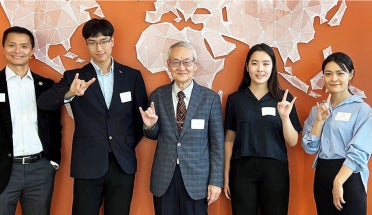
UT Austin Among Peace Corps' 2018 Top Volunteer-Producing Colleges & Universities
- Feb 22, 2018
- Peace Corps
AUSTIN, Texas – Today, the Peace Corps announced that The University of Texas at Austin ranked No. 8 among large schools on the agency’s 2018 Top Volunteer-Producing Colleges and Universities list. There are 61 Longhorns currently volunteering worldwide. In 2017, UT Austin ranked No. 25.
“Peace Corps service is a profound expression of the idealism and civic engagement that colleges and universities across the country inspire in their alumni,” said Acting Peace Corps Director Sheila Crowley. “As Peace Corps Volunteers, recent college and university graduates foster capacity and self-reliance at the grassroots level, making an impact in communities around the world. When they return to the United States, they have new, highly sought-after skills and an enterprising spirit that further leverages their education and strengthens their communities back home.”
Alumni from more than 3,000 colleges and universities nationwide have served in the Peace Corps since the agency’s founding in 1961. Since 1961, 1,838 alumni from UT Austin have traveled abroad to serve as volunteers. In 2017, the state of Texas ranked No. 5 among states with the highest number of Peace Corps volunteers.
One UT Austin alumnus currently making a difference as a Peace Corps volunteer in Dallas, Texas, native Josh Alvarez. The first-generation college graduate and member of the Class of 2015 credits UT Austin with giving him the tools and skills to serve in the Peace Corps.
“The University of Texas at Austin's slogan – ‘What starts here changes the world’ – has been a call to action for me and many alumni to discover ways that we can make a positive impact through our careers,” Alvarez said. “UT Austin offers a lot of opportunities for students to learn how they can give back and be altruistic. The university emphasizes and motivates its students to get involved on and off campus in causes that go far beyond our academic majors. This is what I see that the university has done so well and why many students aspire to become Peace Corps volunteers. This holistic approach to education has prepared many alumni to change the world by joining the Peace Corps.”
As a community economic development volunteer in Costa Rica, Alvarez has been coaching indigenous micro-entrepreneurs, particularly women and youth, to develop local businesses to form sustainable community tourism, and create new economic opportunities focusing on preserving local cultural and environmental resources. He has led several workshops on entrepreneurship and business plan design to inspire a new generation of business owners.
Alvarez has also collaborated with the nonprofit Courts for Kids and the local community development association to build a multiuse athletic court with the goal of providing more athletic opportunities for local youth. He has also worked with a group of at-risk teens to design a community mural.
“The focus was to train them on leadership skills and strengthen the pride in their indigenous identity,” Alvarez said. “This resulted in them learning how to design and manage a project which was financed through community fundraising and grants.”
During his time at UT Austin, Alvarez participated in the Mexican American Culture Committee, the Senate of College Councils, the Undergraduate Studies Council, the Transfer Student Board, and the Social Entrepreneurship Association.
“I had the opportunity to study abroad through a program offered by Texas Global called Community & Social Development, where I went for a ‘Maymester’ during my senior year to study at the University of Cape Town in South Africa,” Alvarez said. “Throughout my time there, I worked with other students on helping and learning from social entrepreneurs within the townships. This was where I found my passion in social entrepreneurship and decided to apply to the Peace Corps.”
After completing his service, Alvarez plans to pursue opportunities in the field of social enterprise, earn a master’s in business administration or public policy, and possibly hold public office.
“Serving in the Peace Corps has empowered me to continue serving my country, therefore I want to focus on domestic issues, including income inequality,” Alvarez said. “In the long-term, I see myself in public office working on issues that affect all Americans. We need people like Peace Corps Volunteers whose values reflect the best of our country to serve in public office.”
The Peace Corps ranks its top volunteer-producing colleges and universities annually according to the size of the student body. Rankings are calculated based on the fiscal year 2017 data as of September 30, 2017, as self-reported by Peace Corps volunteers. View the complete 2018 rankings of the top 25 schools in each category.
###
About the Peace Corps
The Peace Corps sends Americans with a passion for service abroad on behalf of the United States to work with communities and create lasting change. Volunteers develop sustainable solutions to address challenges in education, health, community economic development, agriculture, environment and youth development. Through their Peace Corps experience, volunteers gain a unique cultural understanding and a life-long commitment to service that positions them to succeed in today's global economy. Since President John F. Kennedy established the Peace Corps in 1961, more than 230,000 Americans of all ages have served in 141 countries worldwide.



